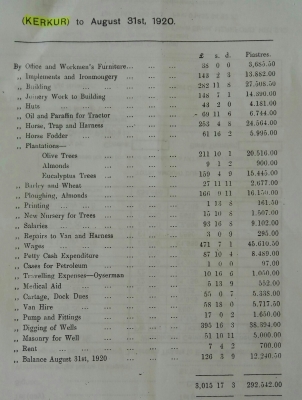A Century-Old Dream of Aliyah
My grandfather's family originally planned to make Aliyah in the 1920s – exactly 100 years ago – with the intention of settling in a small village near Binyamina named Karkur. This is the story of Scottish and other British religious Jews, whose intense desire to live in the Holy Land led them to found institutions that would purchase land, sign up potential pioneering families, and brush aside all obstacles to their goal of Aliyah.
My grandparents Harris and Hannah Simon left Lithuania in 1906 and settled in Edinburgh. Like many other transplanted Lithuanian Jews, they dreamed of settling in Palestine. Fortunately, their dream was shared by others in Edinburgh, London and other UK cities. These pioneers-to-be formed a limited liability company, The First London Achuzah Company, to buy land and create a farming community in the Land of Israel.
By 1920, The First London Achuzah Company had already authorized 2,000 shares at £25 each and had brought in £25,000, purchasing land from the Palestine Land Development Company in Karkur and adjacent Rabia. Company directors had already gone to Palestine, bringing with them army huts, a tractor, and various tools and agricultural implements. A large tract of land was leased to nearby Arabs for farming, and a nursery of 4,000 olive and 1,600 almond trees was purchased. After boring a well 22 meters into the soil, the property finally yielded 3,000 gallons of good fresh water.
The First London Achuzah Company's 1920 Annual Report of September 1, reported the colony's costs, including new buildings, iron works, pumps, horses, olive and almond trees, eucalyptus trees to drain the swamps, and expenses for barley and wheat, as well as labor and management costs. The Report sums up the company's progress by stating: "The Directors think that the shareholders will feel satisfied with the start made on their behalf and … that very shortly the Colony will be sufficiently developed to receive all those members who are prepared to go and make their permanent home there."
The Annual Report also mentioned that three men from Edinburgh had traveled to Palestine to check on the company's investments, but caught typhoid fever on their return home and died in Port Said, Egypt.
Those members anxious to settle in Karkur included my grandfather and grandmother. There were other families that went to Palestine from Edinburgh such as the Kaufmans, the Tossmans, who went as early as 1920, and the Nathans, to name a few. But as serious proposed pioneers, the family prepared themselves by sending their son David to study agriculture in Canada in 1932. Although all shipping and other arrangements had already been made for the move to Israel in the mid-1930s, my grandfather became gravely ill, passing away in 1936, and sadly the family had to stay in Edinburgh. David returned home from Canada, later graduating as a doctor in Edinburgh. The dream of Aliyah was abandoned.
Eight years later, a woman and her daughter arrived in Edinburgh from Israel. Although her name was also Simon, she was no relation. The woman was persuaded by my mother to sell her the rights to the family's land in Israel. My mother's brothers and sister found out, resulting in a fierce family row.
In 1986, after selling my business, my late wife and I made aliyah. Soon after our arrival, we traveled to Karkur to request assistance. After explaining who I was and the family's history with Karkur, Mr. Perach, the local official, took down a thick file that contained many letters from my mother, her brothers and her sister. The records showed that during the intervening years much had happened in Karkur and Israel, and the family connection to Karkur was lost.
Meanwhile, Karkur had slowly progressed from an empty wasteland to a sleepy farming colony founded by English-speaking pioneers, then becoming a moshav, which today has morphed into Pardes Chana-Karkur, an up-and-coming residential area on the Binyamina train line.
My grandfather would have been pleased to know that two of his grandchildren and two of his great-grandchildren have fulfilled his dream of Aliyah.









Comments